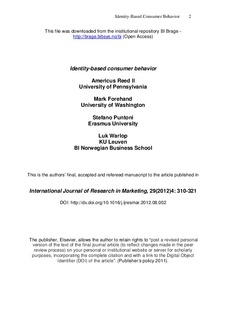| dc.contributor.author | Reed, Americus | |
| dc.contributor.author | Forehand, Mark | |
| dc.contributor.author | Puntoni, Stefano | |
| dc.contributor.author | Warlop, Luk | |
| dc.date.accessioned | 2012-12-05T11:48:15Z | |
| dc.date.available | 2012-12-05T11:48:15Z | |
| dc.date.issued | 2012 | |
| dc.identifier.issn | 1873-8001 | |
| dc.identifier.uri | http://hdl.handle.net/11250/93734 | |
| dc.description | This is the authors’ final, accepted and refereed manuscript to the article | no_NO |
| dc.description.abstract | Although the influence of identity on consumer behavior has been documented in many streams of literature, the absence of a consistent definition of identity and of generally accepted principles regarding the drivers of identity-based behavior complicates comparisons across these literatures. To resolve that problem, we propose a simple but inclusive definition of identity. Identity can be defined as any category label with which a consumer self-associates that is amenable to a clear picture of what a person in that category looks like, thinks, feels and does. Building from this definition, we propose the following five basic principles that can help researchers model the process of identity formation and expression: (1) Identity Salience: identity processing increases when the identity is an active component of the self; (2) Identity Association: the non-conscious association of stimuli with a positive and salient identity improves a person’s response to the stimuli; (3) Identity Relevance: the deliberative evaluation of identity-linked stimuli depends on how diagnostic the identity is in the relevant domain; (4) Identity Verification: individuals monitor their own behaviors to manage and reinforce their identities; and (5) Identity Conflict: identity-linked behaviors help consumers manage the relative prominence of multiple identities. To illustrate the potential usefulness of these principles for guiding identity research, we discuss new avenues for identity research and explain how these principles could help guide investigations into these areas. | no_NO |
| dc.language.iso | eng | no_NO |
| dc.publisher | Elsevier | no_NO |
| dc.subject | identity | no_NO |
| dc.subject | consumer behavior | no_NO |
| dc.title | Identity-based consumer behavior | no_NO |
| dc.type | Journal article | no_NO |
| dc.type | Peer reviewed | no_NO |
| dc.source.pagenumber | 310-321 | no_NO |
| dc.source.volume | 29 | no_NO |
| dc.source.journal | International Journal of Research in Marketing | |
| dc.source.issue | 4 | no_NO |
| dc.identifier.doi | 10.1016/j.ijresmar.2012.08.002 | |
